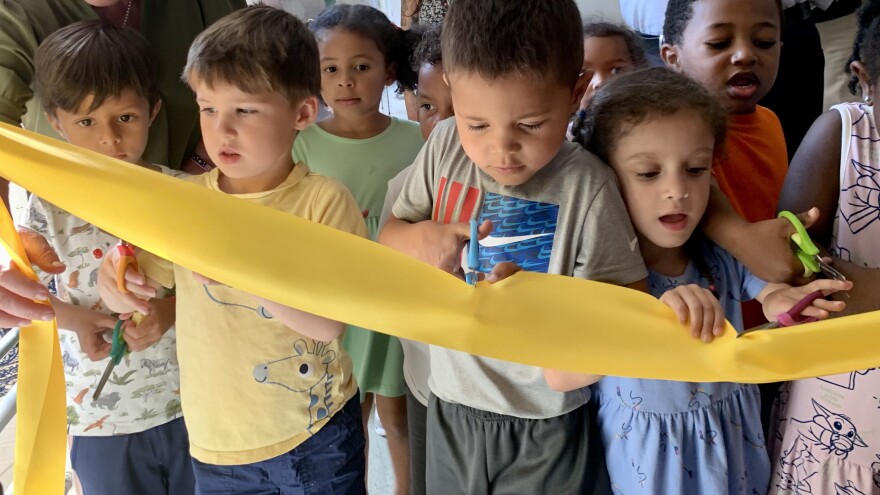BETHLEHEM, Pa. — Michele McEllroy said every day she takes calls from desperate parents seeking day care for their kids.
She’s the owner of Cuddle Zone, a child care center in Allentown.
Since the so-called fiscal cliff in September — when $24 billion in COVID-19 pandemic funding for child care facilities in Pennsylvania and nationwide expired — state and local early education advocates, experts and day care operators say the effects have been wide-ranging.
More families on waitlists. Less money for staff wages. And some businesses have had to increase tuition rates to cope with rising prices.
“Most of them want care to start next week, which is an impossibility,” McEllroy said. “Some of them will come in and tour the center and what we are telling families right now is to do a registration and security deposit to hold for the next available slot, whenever that might be — whether it's in two months, or six months, or a year from now."
At a loss for services
Diane Barber, executive director of the Pennsylvania Child Care Association, said she started hearing of some businesses shutting their doors shortly after the funding ran out.
“I think it was the end of October that within a four-week period, I knew of five programs that had closed,” she said.
A June 2023 report from the Century Foundation, a progressive think tank, predicted more than 150,000 children in Pennsylvania would lose child care and nearly 2,900 programs would close. Child care organizations said the impact of the lapsed funding has been a slow erosion of the supply of classrooms, workers and spaces.
A survey of Pennsylvania child care programs conducted in October by The Children’s Hospital of Philadelphia Policy Lab received 726 responses. Those programs reported nearly 26,000 more kids across Pennsylvania could be served with additional staff; and, more than 27,000 families were waitlisted for a spot in a classroom.
“In the past, it's always been you could find staff who wanted to work in child care for the love of children and were more accepting of lower wages because that's the way it's always been. What we're finding now is there isn't anyone to hire that wants to do that any longer.”Michele McEllroy, owner of Cuddle Zone
Gov. Josh Shapiro’s office said in September the federal government awarded the state $728.8 million from the American Rescue Plan in 2021. In January 2022, Pennsylvania received $455.7 million in additional pandemic funding, which had to be allocated by September 2023 and spent by September 2024. A spokesman for the governor last fall said that a majority of those dollars would go to supporting an increased subsidy rate for child care providers, reducing family co-pays and assisting with non-traditional child care.
Disparity in pay
McEllroy said she used federal COVID-19 money to increase staff wages and hire more workers. She said she was able to bump up her teachers not funded through the state’s Pre-K Counts program to $15-to-$18 an hour. The Pre-K Counts program has specific higher education requirements and those teachers can make around $30 an hour or more. The day care owner said when the supplemental dollars expired, she had to slash her employees' wages for those outside of Pre-K Counts.
“Child care is pretty much on the backs of the parents and the staff,” McEllroy said. “In the past, it's always been you could find staff who wanted to work in child care for the love of children and were more accepting of lower wages because that's the way it's always been. What we're finding now is there isn't anyone to hire that wants to do that any longer.”
According to state child care advocates, the average wage in the industry is about $12.50 an hour, resulting in about 21% of workers having to rely on Medicaid and food assistance programs. When the pandemic hit in 2020, day cares, like most other businesses, closed. Childhood educators had to find other jobs, and Barber said many of them didn’t come back after centers reopened.
“What we weren't able to do is to match the salaries that they were being paid at Target and Walmart, or Chick-fil-A, in our child care centers. And so it was tough to get folks back. So what's happening now is that if the child care program doesn't have enough staff, they can't open fully, so they may have closed classrooms. That impacts both families and their financial sustainability because if they have 10 classrooms and two of those classrooms are closed, they're still paying the rent for 10 classrooms.”
Out of reach
McEllroy said she has recently raised tuition to deal with the rise of inflation. Her center’s school age program, which serves 5- to 10-year-olds, is currently shuttered.
The lack of staff, classroom space and higher tuition costs can put finding child care out of reach for many Lehigh Valley families. McEllroy said she believes the barriers to access have affected parents being able to re-enter the workforce.
“I think it's hindering the ability for people to get back into work, because if they can't find child care, they can't accept positions,” McEllroy said. “I think what happens is someone goes and applies for a position today and they get hired, they need care to start Monday.”
The 2023-24 state budget included $90 million in increased child care funding. Businesses, families and early education advocates are waiting to see what the governor proposes in his recommended budget later this year.
President Joe Biden and congressional Democrats have pushed for an additional $16 billion in emergency child care funding, but lawmakers have not agreed to pass the appropriation. U.S. Rep. Susan Wild, D-Lehigh Valley, has signed on to two pieces of legislation that would provide $16 billion in grants annually for five years to child care programs and help to shore up the sector in the long-term.
Calls for greater funding
Jen DeBell, executive director of the Pennsylvania Association for the Education of Young Children, said her group, which is also part of a national network, is advocating for the additional funding.
"We are seeking from both sides of the aisle that support for child care, to keep the industry stabilized, hopefully help with more recruitment and retention of staff," she said. "Then also, in addition to that emergency funding, making sure that the regular appropriations process includes those recurring increases for child care, too."
Many of the child care system’s problems predate the pandemic, such as low wages and the cost to families, Barber said. But she said the situation has gotten to the breaking point that there needs to be an emergency investment in programs, families and early educators.
She compares it to a popular game in which players take turns removing one of 54 blocks constructed into a tower.
“How we’ve funded child care is actually like a game of Jenga," she said. "So we've moved things around, we've increased expectations so we've kind of moved the blocks.
"But what we've not done is we've not invested in the base. And as you continue to move the blocks around to build the tower higher, we know how it ends, right?
Unless you've set those blocks on a tower, it's going to be a crash, and it's going to be really loud. And the whole thing is going to fall apart.”


